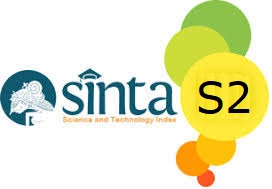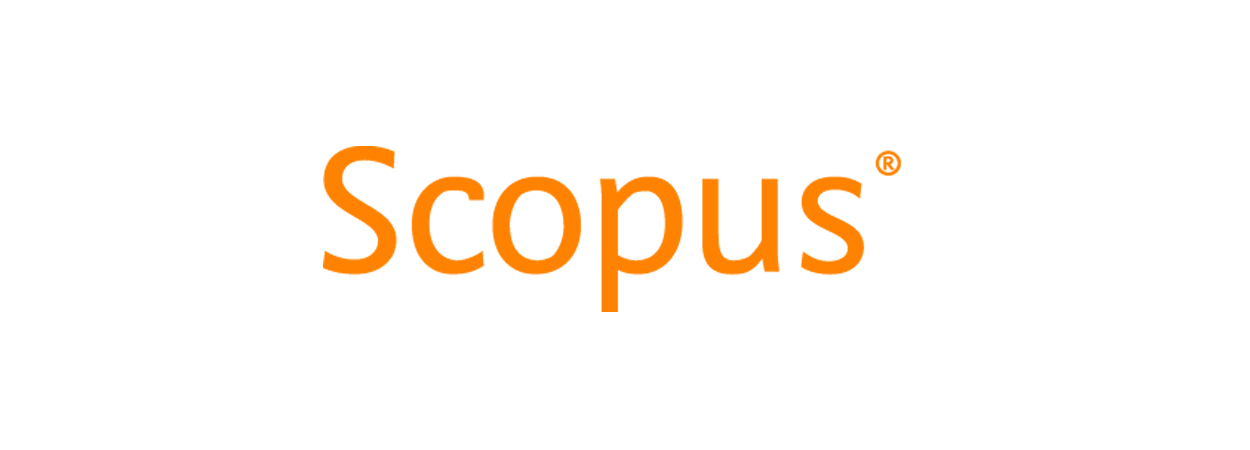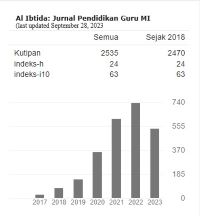Trend in Improving Teacher Competence in Innovative Learning at Primary School
(1) Universitas Islam Negeri Siber Syekh Nurjati Cirebon
(2) European Business School of Barcelona
(*) Corresponding Author
Abstract
Abstract
This study aims to identify global trends in improving elementary school teacher competency through innovative learning approaches. The method employed is a systematic literature review (SLR) based on the PRISMA protocol, which analyzes 35 selected articles from reputable international journals published between 2015 and 2024. The results of the study indicate that project-based learning (PBL) is the most dominant approach used in teacher competency development, followed by technology integration and continuous professional training. This study also highlights the importance of techno-pedagogical competency, reflective ability, and adaptation to local socio-cultural contexts. In addition, geographical disparities and access to training were found to have an impact on the education quality gap between regions. This study recommends integrating the TPACK model and reflective practices into teacher training designs, along with contextual and data-driven policies. These findings offer both conceptual and practical contributions to designing strategies that enhance elementary teacher professionalism, aligning with the demands of the 21st century.
Keywords: innovative learning, primary education, professional development, teacher competence.
Abstrak
Penelitian ini bertujuan untuk mengidentifikasi tren global dalam meningkatkan kompetensi guru sekolah dasar melalui pendekatan pembelajaran yang inovatif. Metode yang digunakan adalah tinjauan pustaka sistematis (SLR) berdasarkan protokol PRISMA, yang menganalisis 35 artikel terpilih dari jurnal internasional terkemuka yang diterbitkan antara tahun 2015 dan 2024. Hasil studi menunjukkan bahwa pembelajaran berbasis proyek (PBL) adalah pendekatan yang paling dominan digunakan dalam pengembangan kompetensi guru, diikuti oleh integrasi teknologi dan pelatihan profesional berkelanjutan. Penelitian ini juga menyoroti pentingnya kompetensi tekno-pedagogis, kemampuan reflektif, dan adaptasi terhadap konteks sosial budaya setempat. Selain itu, disparitas geografis dan akses ke pelatihan ditemukan berdampak pada kesenjangan kualitas pendidikan antar-wilayah. Penelitian ini merekomendasikan pengintegrasian model TPACK dan praktik reflektif ke dalam desain pelatihan guru, bersama dengan kebijakan kontekstual dan berbasis data. Temuan ini menawarkan kontribusi konseptual dan praktis untuk merancang strategi yang meningkatkan profesionalisme guru sekolah dasar, yang sejalan dengan tuntutan abad ke-21.
Kata kunci: kompetensi guru, pembelajaran inovatif, pendidikan dasar, pengembangan profesional.
Full Text:
PDFReferences
Ahyani, E., Rifky, S., Muharam, S., Murnaka, N. P., Kadiyo, & Dhunani, E. M. (2024). Implementation of Teacher Performance Management to Improve Education Quality. Cendikia: Media Jurnal Ilmiah Pendidikan, 14(4), 391–398. https://doi.org/10.35335/cendikia.v14i4.4855
Arfanaldy, S. R. (2024). Innovation Management Strategy In The Development Of Educational Startups Case Study On Excellenz Digital Education, Kuningan Regency [UIN Siber Syekh Nurjati Cirebon]. https://repository.syekhnurjati.ac.id/15003/
Arfanaldy, S. R. (2025). Effective Leadership Styles in Project Management: A Literature Analysis of Their Impact on Project Success. International Journal of Multidisciplinary Approach Research and Science, 3(02), 652–665. https://doi.org/10.59653/ijmars.v3i02.1544
Arifudin, O., Rifky, S., Muhammad, I., & Kurniawati. (2024). Research Trends Education Management in Indonesia. Journal of Education Global, 1(2), 165–173. https://penaeducentre.com/index.php/JEdG/article/view/82
Ariyani, Y. D., Wilujeng, I., Wangid, M. N., Wijaya, D. P., Wahyudi, A., & Istiqomah, I. (2024). Primary teachers’ readiness to use project: investigate teachers’ efficacy and attitude toward project-based learning. International Journal of Evaluation and Research in Education (IJERE), 13(6), 3848. https://doi.org/10.11591/ijere.v13i6.28198
Bajrami, V. (2019). Inclusive Education In Multicultural Environments In Europe And Kosovo. Knowledge International Journal, 32(1), 113–121. https://doi.org/10.35120/kij3201113b
Birgili, B. (2015). Creative and Critical Thinking Skills in Problem-based Learning Environments. Journal of Gifted Education and Creativity, 2(2), 71–71. https://doi.org/10.18200/jgedc.2015214253
Budnyk, O. (2019). Innovative Competence af A Teacher: Best European Practices. Journal of Vasyl Stefanyk Precarpathian National University, 6(1), 76–89. https://doi.org/10.15330/jpnu.6.1.76-89
Chu, S. K. W., Reynolds, R. B., Tavares, N. J., Notari, M., & Lee, C. W. Y. (2017). Introduction. In 21st Century Skills Development Through Inquiry-Based Learning (Issue 2016, pp. 3–16). Springer Singapore. https://doi.org/10.1007/978-981-10-2481-8_1
Connolly, C., Logue, P. A., & Calderon, A. (2023). Teaching about curriculum and assessment through inquiry and problem-based learning methodologies: an initial teacher education cross-institutional study. Irish Educational Studies, 42(3), 443–460. https://doi.org/10.1080/03323315.2021.2019083
Costes-Onishi, P., Baildon, M., & Aghazadeh, S. (2020). Moving inquiry-based learning forward: A meta-synthesis on inquiry-based classroom practices for pedagogical innovation and school improvement in the humanities and arts. Asia Pacific Journal of Education, 40(4), 552–575. https://doi.org/10.1080/02188791.2020.1838883
Damayanti, F., Vivien, H., Situmorang, M., Trianung, T., & Supadi. (2023). The problem of education in Indonesia is the independent curriculum the solution. Cendikia : Media Jurnal Ilmiah Pendidikan, 13(5), 917–924. https://doi.org/10.35335/cendikia.v13i5.3765
Divac, V. M., Stašević, F., Kostić, M. D., Popović, D., & Đurđević Nikolić, J. (2022). Inquiry and Project-Based Learning as an Approach for Developing Entrepreneurship Competencies in Primary School High-Achieving Students. Journal of Baltic Science Education, 21(6A), 1143–1164. https://doi.org/10.33225/jbse/22.21.1143
García González, M., & Veiga Díaz, M. T. (2015). Guided Inquiry and Project-Based Learning in the field of specialised translation: a description of two learning experiences. Perspectives, 23(1), 107–123. https://doi.org/10.1080/0907676X.2014.948018
Goldstein, O. (2016). A project-based learning approach to teaching physics for pre-service elementary school teacher education students. Cogent Education, 3(1), 1200833. https://doi.org/10.1080/2331186X.2016.1200833
Haatainen, O., & Aksela, M. (2021). Project-based learning in integrated science education: Active teachers’ perceptions and practices. LUMAT: International Journal on Math, Science and Technology Education, 9(1), 149–173. https://doi.org/10.31129/LUMAT.9.1.1392
Habók, A., & Nagy, J. (2016). In-service teachers’ perceptions of project-based learning. SpringerPlus, 5(1), 83. https://doi.org/10.1186/s40064-016-1725-4
Harrell, P. E., Thompson, R., & Waid, J. (2023). Using inquiry-based learning to develop Earth science pedagogical content knowledge: impact of a long-term professional development program. Research in Science & Technological Education, 41(4), 1519–1538. https://doi.org/10.1080/02635143.2022.2052037
Haryanti, Y. D., Sapriya, S., Permana, J., Syaodih, E. W., & Kurino, Y. D. (2022). Improving the Critical Thinking Skills of Elementary School Students through Problem Based Learning and Inquiry Models in Social Science Learning. Al Ibtida: Jurnal Pendidikan Guru MI, 9(2), 292. https://doi.org/10.24235/al.ibtida.snj.v9i2.10485
Hoic-Bozic, N., Laanpere, M., Pata, K., Frankovic, I., & Teder, S. (2016). Introducing inquiry-based learning to Estonian teachers: Experiences from the Creative Classroom project. 2016 39th International Convention on Information and Communication Technology, Electronics and Microelectronics (MIPRO), 1010–1015. https://doi.org/10.1109/MIPRO.2016.7522287
Joseph, V., Sheikh, I., & Rajani, S. (2022). Inquiry Based Learning Method Of Teaching In Education: A Literature Review. Webology, 19(3), 799. https://openurl.ebsco.com/EPDB%3Agcd%3A5%3A28973429/detailv2?sid=ebsco%3Aplink%3Ascholar&id=ebsco%3Agcd%3A172018297&crl=c&link_origin=scholar.google.com%0A
Kavanagh, S. S., Farrow, J., Bernhard, T., Guillotte, A., & Dean, C. P. (2024). Practicing inquiry: Investigating how coaches support teachers to lead inquiries in project-based learning classrooms. Teaching and Teacher Education, 144, 104575. https://doi.org/10.1016/j.tate.2024.104575
Lau, W. W. F., Lui, V., & Chu, S. K. W. (2017). The use of wikis in a science inquiry-based project in a primary school. Educational Technology Research and Development, 65(3), 533–553. https://doi.org/10.1007/s11423-016-9479-9
Lavonen, J. (2018). Educating Professional Teachers in Finland through the Continuous Improvement of Teacher Education Programmes. In Contemporary Pedagogies in Teacher Education and Development (Vol. 11, Issue tourism, p. 13). InTech. https://doi.org/10.5772/intechopen.77979
Li, J., Luo, H., Zhao, L., Zhu, M., Ma, L., & Liao, X. (2022). Promoting STEAM Education in Primary School through Cooperative Teaching: A Design-Based Research Study. Sustainability, 14(16), 10333. https://doi.org/10.3390/su141610333
Liu, H.-H., Wang, Q., Su, Y.-S., & Zhou, L. (2019). Effects of Project-Based Learning on Teachers’ Information Teaching Sustainability and Ability. Sustainability, 11(20), 5795. https://doi.org/10.3390/su11205795
Mabe, A., Brown, K., Frick, J. E., & Padovan, F. (2022). Using Technology to Enhance Project-Based Learning in High School : A Phenomenological Study. Education Leadership Review of Doctoral Research, 10, 1–14. https://eric.ed.gov/?id=EJ1380610
Maher, D., & Yoo, J. (2017). Project-Based Learning in the Primary School Classroom. Journal of Education Research, 11(1), 77. https://openurl.ebsco.com/EPDB%3Agcd%3A2%3A654370/detailv2?sid=ebsco%3Aplink%3Ascholar&id=ebsco%3Agcd%3A135950323&crl=c&link_origin=scholar.google.com
Mallarangan, A. D. D., Widiantoro, D., Ernawati, Rifky, S., & Ulum, M. (2024). Analysis of the Influence of School Principal Leadership Style on Teacher Discipline in Integrated Private Schools. Journal on Education, 6(2), 14168–14173. https://doi.org/10.31004/joe.v6i2.5270
Masduki, Arfanaldy, S. R., Pamuncak, M. B., & Fahmi. (2025). Urgency of Multicultural Education in Building a Civil Society: International Journal of Islamic Thought and Humanities, 4(1), 117–129. https://doi.org/10.54298/ijith.v4i1.399
Molina-Torres, M.-P. (2022). Project-Based Learning for Teacher Training in Primary Education. Education Sciences, 12(10), 647. https://doi.org/10.3390/educsci12100647
Murphy, C., Smith, G., Mallon, B., & Redman, E. (2020). Teaching about sustainability through inquiry-based science in Irish primary classrooms: the impact of a professional development programme on teacher self-efficacy, competence and pedagogy. Environmental Education Research, 26(8), 1112–1136. https://doi.org/10.1080/13504622.2020.1776843
Narayanti, P. S., Pranajaya, S. A., Sucianti, I., Rifky, S., & Hajerina. (2024). Values Education in The Era Globalization: Preparing Students to Face an Increasingly Competitive World. International Journal of Teaching Learning, 2(3), 615–626. https://injotel.org/index.php/12/article/view/96
Nasrul, Hasnah, S., & Dzakiah. (2022). Kompetensi Guru Di Era Society 5 . 0. Prosiding Kajian Islam Dan Integrasi Ilmu Di Era Society 5.0 (KIIIES 5.0) Pascasarjana Universitas Islam Negeri Datokarama Palu, 1, 116–120. https://kiiies50.uindatokarama.ac.id/
Pan, H.-L. W., Chen, C.-H., & Wiens, P. D. (2024). Teacher Professional Development and Practice of Project-Based Learning in Taiwan: The Moderating Effect of Self-Efficacy. Asia Pacific Journal of Education, 44(4), 707–722. https://doi.org/10.1080/02188791.2022.2114423
Pradana, G. Y., Anam, R. S., Mariana, N., & Yunianika, I. T. (2024). The Influence of Problem-Based Learning Model Assisted by Interactive Multimedia Google Sites on Critical and Creative Thinking Skills in Elementary School. Al Ibtida: Jurnal Pendidikan Guru MI, 11(2), 320. https://doi.org/10.24235/al.ibtida.snj.v11i2.18281
Purba, N., Sipayung, R. W., Rahmawati, R., Siagian, B. A., Herman, H., Saragi, C. N., & Fatmawati, E. (2024). An Implementation of Project-Based Learning (PBL) Teaching Model in Improving Early Child’s Critical Thinking Skill. Library of Progress-Library Science, Information Technology & Computer, 44(3), 90. https://openurl.ebsco.com/EPDB%3Agcd%3A12%3A19454524/detailv2?sid=ebsco%3Aplink%3Ascholar&id=ebsco%3Agcd%3A180917225&crl=c&link_origin=scholar.google.com
Putri, L. I., Ananta, G. P., & Syafa’at, I. (2024). Is the Problem Based Learning Using Media Puzzle Effective on Students’ Mathematical Connection Ability? Al Ibtida: Jurnal Pendidikan Guru MI, 11(2), 229. https://doi.org/10.24235/al.ibtida.snj.v11i2.15048
Rehman, N., Zhang, W., Mahmood, A., Fareed, M. Z., & Batool, S. (2023). Fostering twenty-first century skills among primary school students through math project-based learning. Humanities and Social Sciences Communications, 10(1), 424. https://doi.org/10.1057/s41599-023-01914-5
Repinc, U., & Južnič, P. (2015). Inquiry-Based Learning: Evaluation of Three Years Projects in Slovenian Primary School. Journal of Education Research, 9(2).
Rifky, S. (2024). The Impact of Using Artificial Intelligence on Higher Education. Indonesian Journal of Multidisciplinary on Social and Technology, 2(1), 37–42. https://doi.org/10.31004/ijmst.v2i1.287
Rifky, S., & Farihin. (2024). Academic Supervision And Pedagogical Competency As Determinants Of Teacher Performance. International Journal of Teaching Learning, 2(4), 1038–1049. https://injotel.org/index.php/12/article/view/135
Rifky, S., Paling, S., Arifudin, O., & Narayanti, P. S. (2024). Professionalism Of Educators in Learning Development. International Journal of Teaching Learning, 2(2), 579–588. https://injotel.org/index.php/12/article/view/93
Rosidah, S., Zulaeha, I., & Formen, A. (2024). Cultivating Critical Thinking Skills in Early Childhood through Inquiry-Based Learning Models Grounded in Teachers’ Experiences. Golden Age: Jurnal Ilmiah Tumbuh Kembang Anak Usia Dini, 9(1`), 159–169. https://doi.org/10.14421/jga.2024.91-14
Sáez López, J. M. (2023). Project-based Learning: A Case Studying the Catholic Monarchs in Elementary Education. Al Ibtida: Jurnal Pendidikan Guru MI, 10(1), 163. https://doi.org/10.24235/al.ibtida.snj.v10i1.12897
Septiadevana, R., & Abdullah, N. (2024). Developing STEM project-based learning module for primary school teachers: a need analysis. International Journal of Evaluation and Research in Education (IJERE), 13(4), 2585. https://doi.org/10.11591/ijere.v13i4.28894
Simonović, N. (2021). Teachers’ Key Competencies for Innovative Teaching. International Journal of Cognitive Research in Science, Engineering and Education (IJCRSEE), 9(3), 331–345. https://doi.org/10.23947/2334-8496-2021-9-3-331-345
Sintawati, M., Erviana, V. Y., Bhattacharyya, E., Habil, H., & Fatmawati, L. (2022). The effect of project-based learning on technological pedagogical content knowledge among elementary school pre-service teacher. Pegem Journal of Education and Instruction, 12(2), 151–156. https://doi.org/10.47750/pegegog.12.02.15
Sisdiana, E., Noor, I. H., Sofyatiningrum, E., Martini, A. I., & Sudarmaji, A. (2018). PENGUATAN KOMPETENSI GURU (Mengimplementasikan Kurikulum melalui KKG-MGMP Jenjang Dikdas). Pusat Penelitian Kebijakan Pendidikan dan Kebudayaan, Badan Penelitian dan Pengembangan, Kementerian Pendidikan dan Kebudayaan.
Song, Y. (2018). Improving primary students’ collaborative problem solving competency in project-based science learning with productive failure instructional design in a seamless learning environment. Educational Technology Research and Development, 66(4), 979–1008. https://doi.org/10.1007/s11423-018-9600-3
Subiyantoro, S. (2023). Exploring Teachers’ Perspectives on Their Role in Facilitating Project-Based Learning: A Comparative Study of Elementary, Middle, and High School. EDUKASIA: Jurnal Pendidikan Dan Pembelajaran, 4(2), 2973–2980. https://doi.org/10.62775/edukasia.v4i2.825
Syahrir, S., Pujiriyanto, P., As, M., Nur, F. A. M., & Fitri, S. (2024). Primary School STEM Education Innovation through ICT Integration for Teacher Competency Development: A Systematic Literature Review. Jurnal Pendidikan Dan Kebudayaan, 9(1), 47–61. https://doi.org/10.24832/jpnk.v9i1.4896
Tsybulsky, D., & Muchnik-Rozanov, Y. (2021). Project-based learning in science-teacher pedagogical practicum: the role of emotional experiences in building preservice teachers’ competencies. Disciplinary and Interdisciplinary Science Education Research, 3(1), 1–12. https://doi.org/10.1186/s43031-021-00037-8
Udin, T., & Arfanaldy, S. R. (2025). Literature Analysis on Active Learning Models as an Alternative to the Dominance of Lecture Methods in Public Elementary Schools. Edu Cendikia: Jurnal Ilmiah Kependidikan, 5(01), 23–32. https://doi.org/10.47709/educendikia.v5i01.
UNESCO. (2020). Education for sustainable development: a roadmap. UNESCO. https://doi.org/10.54675/YFRE1448
Uyen, B. P., Tong, D. H., & Ngan, L. K. (2023). Online Project-Based Learning for Teacher Education during the COVID-19 Pandemic: A Systematic Review. Contemporary Educational Technology, 15(3), 433. https://eric.ed.gov/?id=EJ1395098
Ventista, O. M., & Brown, C. (2023). Teachers’ professional learning and its impact on students’ learning outcomes: Findings from a systematic review. Social Sciences & Humanities Open, 8(1), 100565. https://doi.org/10.1016/j.ssaho.2023.100565
Viro, E., Lehtonen, D., Joutsenlahti, J., & Tahvanainen, V. (2020). Teachers’ Perspectives on Project-Based Learning in Mathematics and Science. European Journal of Science and Mathematics Education, 8(1), 12–31. https://eric.ed.gov/?id=EJ1242184%0A
Winantaka, B. (2024). The impact of Brain-Based Learning on critical and creative thinking in English Language Teaching. Jurnal Ilmiah WUNY, 6(2), 90–98. https://doi.org/10.21831/jwuny.v6i2.78485
Yuliani, R., Abd Jabar, C. S., & Maryatun, I. B. (2023). The Influence of the Inquiry Project-Based Learning Model on Critical Thinking Skills in Early Childhood: A Quantitative Experimental Study. Golden Age: Jurnal Ilmiah Tumbuh Kembang Anak Usia Dini, 8(3), 193–202. https://doi.org/10.14421/jga.2023.83-08
Yusuf, F. A. (2025). Trends, opportunities, and challenges of artificial intelligence in elementary education - A systematic literature review. Journal of Integrated Elementary Education, 5(1), 109–127. https://doi.org/10.21580/jieed.v5i1.25594
Zhang, W., Guan, Y., & Hu, Z. (2024). The efficacy of project-based learning in enhancing computational thinking among students: A meta-analysis of 31 experiments and quasi-experiments. Education and Information Technologies, 29(11), 14513–14545. https://doi.org/10.1007/s10639-023-12392-2
Zhao, L., Zhao, B., & Li, C. (2023). Alignment analysis of teaching–learning-assessment within the classroom: how teachers implement project-based learning under the curriculum standards. Disciplinary and Interdisciplinary Science Education Research, 5(1), 13. https://doi.org/10.1186/s43031-023-00078-1
Zhou, C. (2023). The Impact of the Project-Based Learning Method on Students. BCP Education & Psychology, 9, 20–25. https://doi.org/10.54691/bcpep.v9i.4603
DOI: 10.24235/al.ibtida.snj.v12i1.19929
Article Metrics
Abstract view : 38 timesPDF - 2 times
Refbacks
- There are currently no refbacks.
Copyright (c) 2025 Al Ibtida: Jurnal Pendidikan Guru MI

This work is licensed under a Creative Commons Attribution 4.0 International License.
Al Ibtida: Jurnal Pendidikan Guru MI Indexed by:
Editorial Office:
FITK Building, 5th Floor, Department of Madrasah Ibtidaiyah Teacher Education, Faculty of Tarbiyah and Teacher Training, UIN Siber Syekh Nurjati Cirebon. Perjuangan Street of Sunyaragi, Cirebon City, West Java, Indonesia 45132. Phone. 0231-481264, Fax. 0231-489926, Email: alibtida@syekhnurjati.ac.id
Al Ibtida: Jurnal Pendidikan Guru MI is licensed under a Creative Commons Attribution 4.0 International License.



















